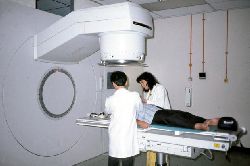RCA News


RCA News
View
| More Access to Life-saving Radiotherapy Urged WHO World Cancer Report Warned Dramatic Increase of World Cancer Radiation Therapy ranks most Important Methods of Curing Local Cancer | |||
|---|---|---|---|
|
Name
admin |
Date
2005.03.15 |
Views
3351 |
|

Incidentally to the WHO report, IAEA Director General, Dr Mohamed ElBaradei, said "a silent crisis in cancer treatment exists in developing countries and is intensifying every year." He further said "at least 50 to 60 percent of cancer victims in the developing world can benefit from radiotherapy facilities, or some 2,200-radiation therapy machines." According to IAEA, some 15 African nations and several countries in Asia lack even one radiation therapy machine. Ethiopia, which has 60 million people, possesses just one such machine, provided by IAEA. Other developing countries have very low ratios of machines per population, often one machine form several million people, versus a ratio of one machine per 250,000 inhabitants, which is typical of most developed countries. The developed world has more than 4,500 treatment machines.
According to WHO, some 6 million people died from cancer in 2000, the last year for which full results are available. Cancer deaths will increase to 10 million per year by 2020, the latest estimates said. IAEA radiation oncologist in its Human Health Division said, "This crisis is predictable and, to some degree preventable, depending on how well we start to manage it." It is noted with enthusiasm that IAEA recently initiated 'PACT' (Programme of Action for Cancer Therapy) policy to accelerate the peaceful applications of nuclear technology to human health.
For more information, please visit to www.iaea.org or write to m.flemming@iaea.org
Attachments




